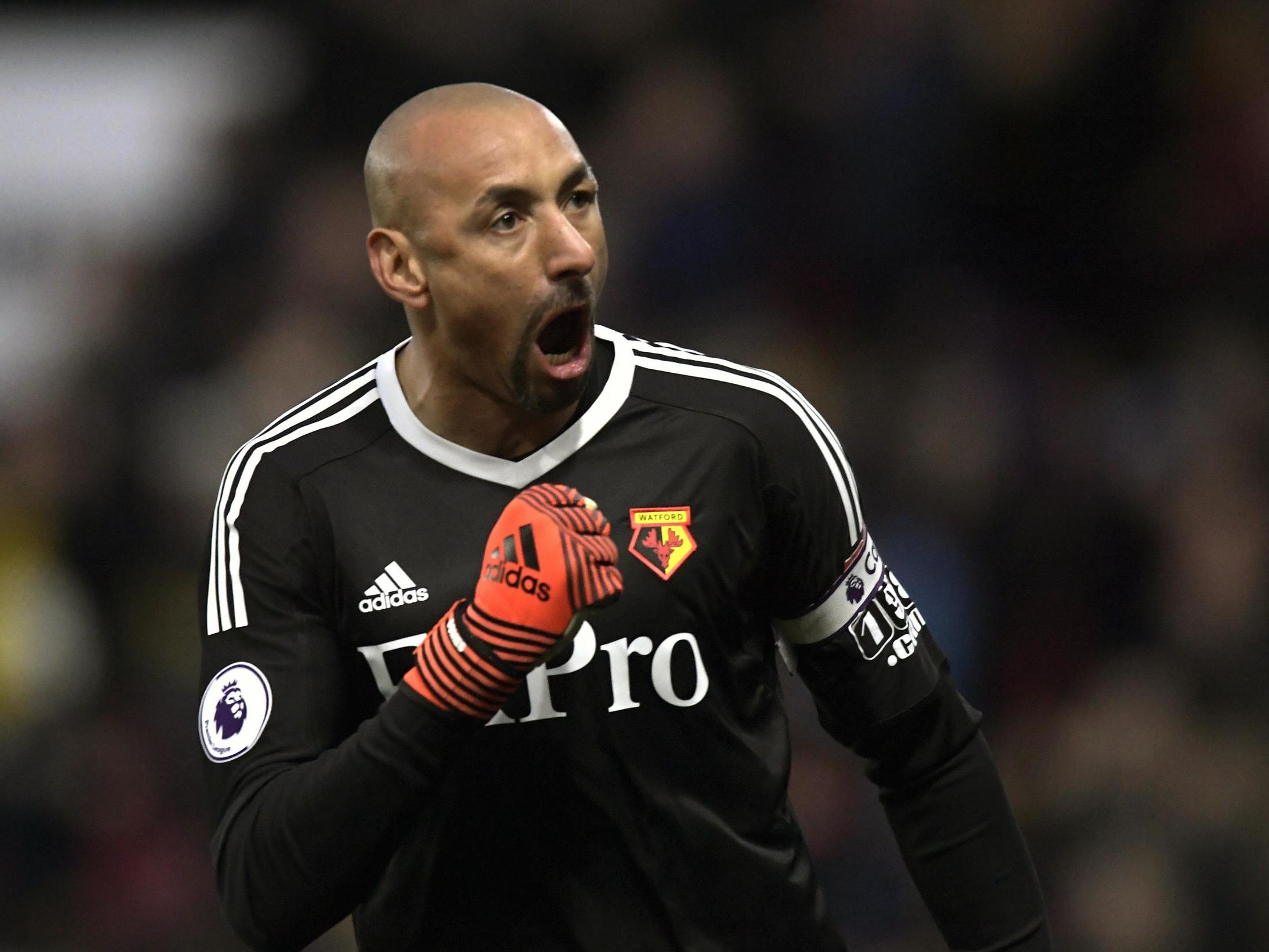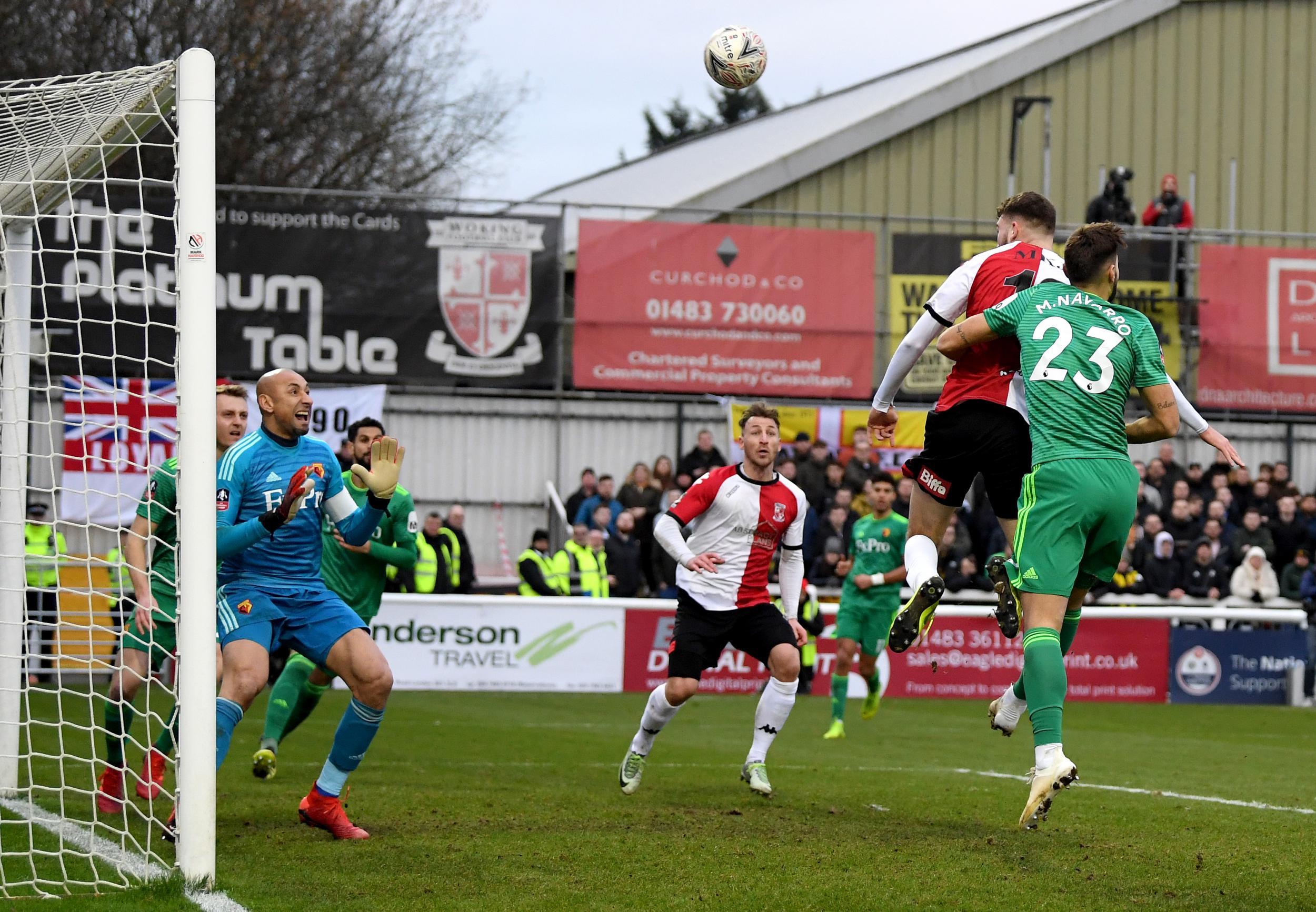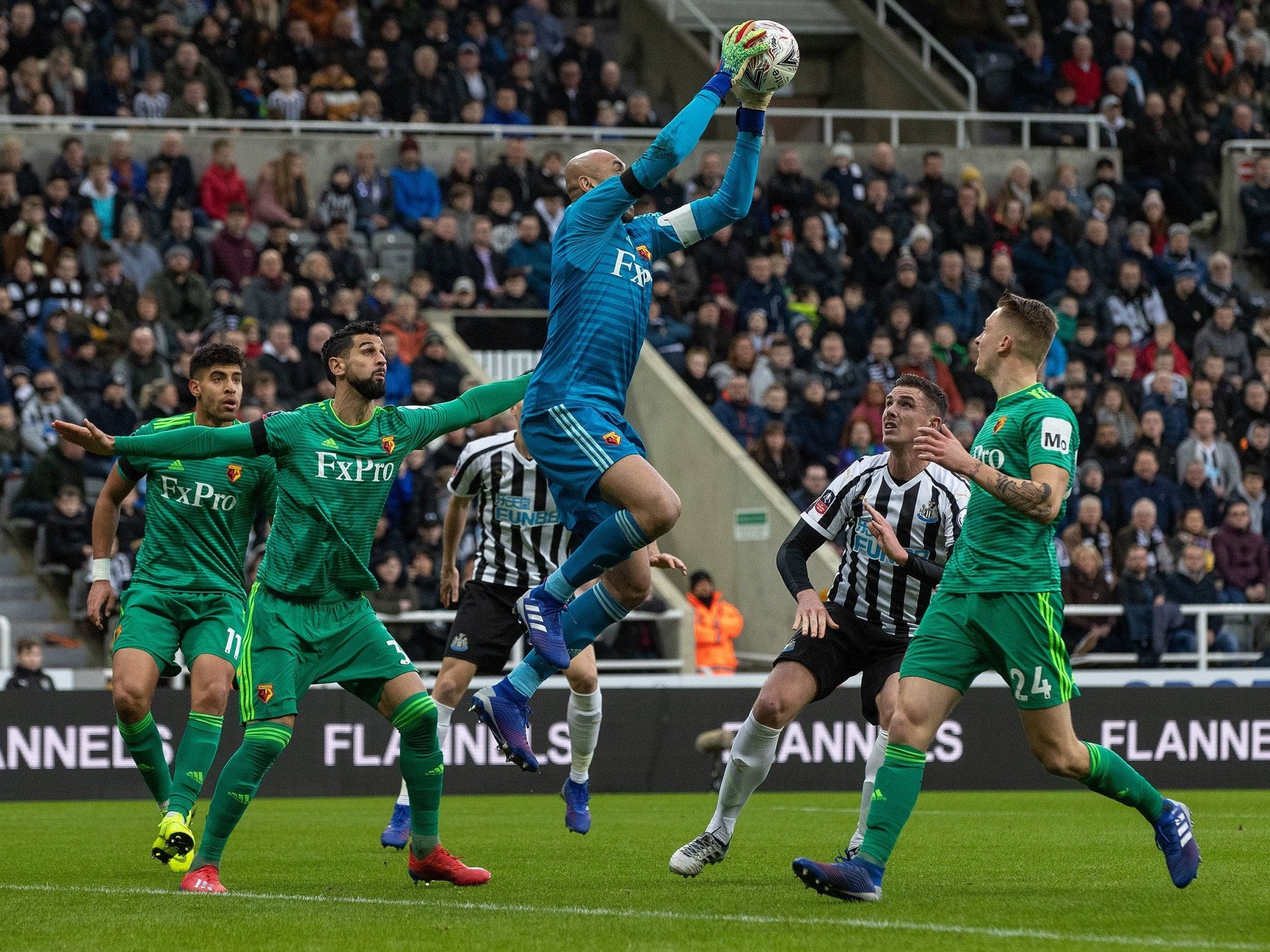How Watford’s Heurelho Gomes juggles his faith in people, Jesus and Jair Bolsonaro
Interview: As the popular goalkeeper approaches retirement and a new career as a football agent, he reflects on the challenges Brazilians face both in the Premier League and back home in a divided nation

Your support helps us to tell the story
From reproductive rights to climate change to Big Tech, The Independent is on the ground when the story is developing. Whether it's investigating the financials of Elon Musk's pro-Trump PAC or producing our latest documentary, 'The A Word', which shines a light on the American women fighting for reproductive rights, we know how important it is to parse out the facts from the messaging.
At such a critical moment in US history, we need reporters on the ground. Your donation allows us to keep sending journalists to speak to both sides of the story.
The Independent is trusted by Americans across the entire political spectrum. And unlike many other quality news outlets, we choose not to lock Americans out of our reporting and analysis with paywalls. We believe quality journalism should be available to everyone, paid for by those who can afford it.
Your support makes all the difference.No one in English football has a bad word to say about Heurelho Gomes. He will retire this summer, 11 years after he arrived here, with the good wishes of everyone he has met. A cult hero at Tottenham, an authentic hero at Watford, he has won people over with his enthusiasm, professionalism and personal warmth.
On Friday Gomes will turn 38, and will play what could be his last ever game of football. Gomes has been one of the best signings of the decade at Watford: playing in goal with consistency, providing stability and leadership at a club where team-mates and managers have come and gone. Along with Troy Deeney, Gomes has been a pillar of the Pozzo era.
But this season has been different. Gomes is no longer first choice, with Ben Foster taking over in the Premier League. Javi Gracia – the eighth manager of Gomes’ time at Vicarage Road – has only played Gomes in the domestic cups. So he will play at Queens Park Rangers in the FA Cup fifth round tomorrow night, but that could well be his farewell game. The FA Cup final on 18 May would be the dream farewell, but few players get to say goodbye on their own terms.
Because Gomes has decided with almost total certainty that this season will be his last. “My plan at the moment is to retire at the end of the season,” he tells The Independent. “We never know, but 99% I am sure I am going to retire. Probably I am going to be involved in football. Not on the pitch, outside of the pitch.”
Gomes plans to become an agent, helping to bring young Brazilian players over to the Premier League, and helping them to settle here. “I know the type of players that the Premier League needs, the type of players that will adapt here.”
Having played here for so long, Gomes already knows exactly what clubs should be looking for. “Do not live here and think they are living in Brazil, that they need to behave the same way that they behave in Brazil. The way we play here is different. You have to be more constant in the game. You have to change a little bit the way you behave. It’s not a move to Holland or a move to Portugal. It is a move to the best league in the world, so you have to be at your best to perform well.”
Gomes knows better than most what it takes to settle here. He has played 185 Premier League games, with a whole Championship promotion season on top of that. And along with all his excellent goalkeeping, some of his best work has been off the pitch. At both Spurs and Watford, Gomes jumped into a leadership role, helping young South Americans to acclimatise to living in England. It is not easy moving across the world as a young person, no matter how well players are paid, but Gomes went out of his way to help.
At Spurs Gomes used to look after Wilson Palacios, Giovanni dos Santos but most of all Sandro. By the time a 21-year-old Sandro arrived from Corinthians in 2010, Gomes was in his third season at Spurs and was himself well settled.

When Harry Redknapp told Sandro he would not be in the squad for Spurs’ Champions League group game at Werder Bremen, Sandro did not understand, and met up with the team at Stansted Airport anyway, looking forward to the game. Gomes had to break the news to him he was not in the squad and had to go home. From that point on, Gomes acted as Sandro’s translator, interpreting between him, Harry Redknapp and Kevin Bond. On weekend days off Gomes would host barbeques at his home in Chigwell, with churrasco, beers and music to remind his team-mates of home on the other side of the world.
“It is so different for us as Brazilians, as South American players. Because the culture here is so different. I felt it a little bit when I first came. Gilberto was at Tottenham, but he left straight away, so I was alone. I always knew, I used to say it at PSV, ‘if you sign Brazilian or south American players, you have to take care of them.’ They need support to perform for you on the pitch.”
Seven years on from Sandro’s arrival, a 20-year-old from Fluminense called Richarlison arrived at Watford. And Gomes assumed the same role. “That was exactly what I did for Richarlison here. When he first came, he was a little bit lost. The club helped a lot, but the language is so difficult. He felt welcome when he saw people that speak the same language, and helped him to find a house.” When winter kicked in and Richarlison kept showing up to training in shorts and flip-flops, Gomes took him to buy warm clothes for the first time. “That can make the difference, when outside the pitch everything is going well, inside the pitch he can deliver what he did for us.”

Gomes speaks with an earnest commitment about helping others. This comes from deep within him. “I have done this with my heart. I have done this because I love to help people. Not only in the football world, but outside as well. That is my type, that is Jesus’ type. This was nothing, it was my pleasure.”
You do not have to spend very long with Gomes to realise that his faith is what drives his life. Like one third of Brazilians, including many footballers – Kaka, David Luiz, Willian – he is part of Brazil’s evangelical community, and he worships at the Christian Community of London, a popular church for Brazilian evangelicals here. “People change a lot the way they worship God, they find the right way to do it. God is opening the mind of the people, that is why people are changing. I was a Catholic, my family is Catholic, but Jesus just grabbed me by the hand and said ‘this is the way I want you to follow.’”
It is not the practice, but the faith itself, that Gomes says has changed his life. “Religion is not important, Jesus is important to me. People think religion will change you, Jesus will change you. It is very important to me to follow him. Some people are in church, but they are not changed. Some people take religion to hide themselves, and when they are out of church, they behave the same. If I behave on the pitch, I have to behave off the pitch as well. I have to be an example. Religion doesn’t change people. Jesus, when you accept him, will change you.”
When far-right Jair Bolsonaro won the run-off round of the Brazilian presidential election in October, nearly 70% of evangelicals voted for him. He was well-supported in the Brazilian sports community, from within UFC, ju-jitsu, and professional surfing and of course football, with Rivaldo, Ronaldinho, Felipe Melo, Lucas Moura and many more throwing their support behind the former army captain. So how much of a surprise should it have been to see Gomes smiling in a ‘Bolsonaro Presidente’ t-shirt in a post on his Instagram from last October? It does feel at odds with everything else we know about Gomes, his compassion, his warmth and sense of caring for others.
Gomes insists that Brazil was in such a bad state after years of PT (workers’ party) rule and corruption that it needed the painful medicine of Bolsonaro. Even though Gomes quickly made clear he could not support every policy of his new president, a man who supports the destruction of the Amazon rainforest and police violence in the favelas.
“We were just going down, down, down, down. We were already there. It is going to take a long time for us to grow again, because of the corruption, and the people just ignoring it.
“We need a change in Brazil. And he was the one and only one that can change the way. I probably don’t support the whole of his ideas. But I support the change…we need a change. That is why we needed to do something, to change everything that was going on in Brazil. The economy has changed already. So he was the only way to change the way that politics were going in Brazil.”

But how can Christians support a man who speaks and acts so hatefully towards women, black people and the LGBT community? “It is the way he speaks,” Gomes says, before arguing that his words have been taken out of context and twisted. “You know how you can turn a piece in a big article. And people are taking that, from the past. His opponents take that and start to feed [it to] people.” He reiterates that he “does not support everything that he said”, and but again draws a distinction between that and “the things that people said that he said”.
Ultimately for Gomes, the support of nearly 58million Brazilians in that election is itself a validation of Bolsonaro’s character. If he was as bad as people said, he would not be this popular. “But how are you going to [get the] support of the 60% [55%] of Brazil that supported him. But how are you going to [get that] support, if someone is like this, like the people are saying? No way. The people are very clever. The people are very clever. He didn’t use the media or television, to make his campaign. Just. Say no more. Now he is doing what he said.”
Gomes was keen to make clear that he is not a committed right-winger, and that he voted for Lula and Dilma Rousseff, the two Workers’ Party presidents who won the four elections before last year’s. “I voted for Lula, I voted for Dilma, I voted for them,” Gomes insisted. “The first election that I voted for president was for Lula [who won in 2002 and 2006]. So I am not like I am supporting anyone. I support the one that I think is right for that time. This is the chance, this is the big chance. If we do not change now, I believe it is going to be hard to change.”
Join our commenting forum
Join thought-provoking conversations, follow other Independent readers and see their replies
Comments